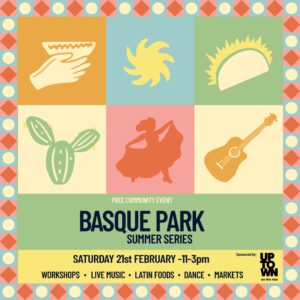Track By Track: Bettye LaVette Flies Once Again with Blackbirds
R&B veteran Bettye LaVette is back with another winning collection of tunes as she releases Blackbirds today.
At age 74, Betteye just seems to be getting better and better. This time around she celebrates the formative work of — as LaVette calls them — “black birds.” All the songs, save for the Beatles song that inspired it, were originally popularized by Black female singers, including Nina Simone, Billie Holiday and Dinah Washington.
Produced by Steve Jordan and released on the Verve label, Bettye seems to just get better and better. The 13th Floor’s Marty Duda spoke to Bettye about each track on this stunning album.
Follow Bettye LaVette: WEBSITE FACEBOOK YOUTUBE INSTAGRAM TWITTER SPOTIFY
Listen to the interview here:
Or read the transcription here:
M: Congratulations on the new album. It’s very exciting to know that you’re still doing the thing and putting out amazing records like this.
B: Thank you.
M: So it’s due out, when is it? Next weekend I think?
B: The 28th.
M: So how are you feeling about it coming out with all this stuff going on around the planet?
B: I don’t know how to feel. I don’t have anything to compare it to.
M: That’s true.
B: I feel virtual.(laughs)
M: Right, ok that’s cool. So Blackbirds is a collection of tunes that you’ve collected from that are mostly older from the 40s, 50s, 60s and I’m just wondering if you can explain to folks what the criteria was that you chose to choose these songs from, cause they go anywhere from an old Nina Simone song to Paul McCartney’s Blackbird.
B: It started out to be a concept of the bridge I came across on. Then all this happened with the racial upheaval and the pandemic and whatever. Especially with the racial upheaval, some of the songs, a couple of the songs, became timely. Blackbird, I did Blackbird because while Paul McCartney wrote it, he was talking about me. Or us in this case which is why I chose to name it Blackbirds and a lot of Americans don’t know that the British called their women birds. I’ve talked to so many people who actually told me they actually thought he was talking about a bird.
M: Well on the Beatles version there is a sound of a bird at the beginning of it.
B: Oh, ok.
M: But I know what you mean, yeah. I’m sure that’s what Paul had in mind. Have you spoken to Paul about it ever?
B: No I have not. He doesn’t speak to a lot of people and I’m not amongst the privileged.
M: Fair enough. But I really found it interesting how you changed that song, cause I mean everybody’s heard it a thousand times off of the White Album and your version is very different in the way that you approach it vocally and then the arrangement so how did that happen?
B: Well that was the way I thought about it. It’s hard for me to feel exactly like anybody else and I don’t cover songs, I don’t cover records, I re-interpret them. I offer my version of whatever it was. If Paul had written it and given it to me, that’s how I would’ve sung it.
M: I was wondering, do you mind just going track by track through it? We’ve talked about the last one, we’ll just comment on each one of the songs because most of the songs…you know when people do cover versions they’re songs that everybody knows but because these songs are from a different time and a place, chances are a lot of folks, especially younger people, won’t know the songs.
B: That was another thing. I wanted these young rhythm and blues singers to know that 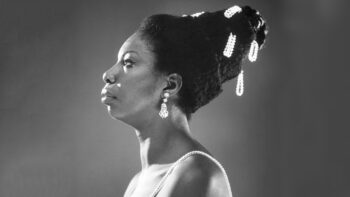 they did not create this, that this is the bridge they came…I’m the bridge actually that they came across on. But this is the bridge that I came across on. I like to talk about the first tune on the album, the Nina Simone song, because it came about so vicariously. I was doing a private party for David Lynch the movie producer, well it was a private concert, a fundraiser and at the end of it, there was an after party and this gentleman came over to me and he said I really enjoyed your song and he’d said my name is Angelo Badalamenti and I loved it.
they did not create this, that this is the bridge they came…I’m the bridge actually that they came across on. But this is the bridge that I came across on. I like to talk about the first tune on the album, the Nina Simone song, because it came about so vicariously. I was doing a private party for David Lynch the movie producer, well it was a private concert, a fundraiser and at the end of it, there was an after party and this gentleman came over to me and he said I really enjoyed your song and he’d said my name is Angelo Badalamenti and I loved it.
M: Isn’t that a great name?
B: My husband knew who he was immediately, I didn’t. He said, ‘I do the music for a lot of David’s movies’, and he said, ‘Years ago I used to write and produce for Nina Simone and I wrote this song for her’. He said I think it would be perfect for you. And I said what’s the name of it and he said I Hold No Grudge and I said you won’t believe this, well at that time, this has been ten years ago and I said you wouldn’t believe this but I’ve had this song in my file for eight years, I heard it eight years ago and so now it’s been like 18 years but I heard it in a beauty salon in Detroit, before I left Detroit and came to New Jersey and I said if I ever am permitted to do this kind of album, I am going to do that tune. And he was so pleased and I was so excited to meet him and especially to hear him say his name.
M: Exactly. That opens up the album with this kind of stinging guitar which I assume is played by Smokey Hormel and this kind of simmering groove that gets laid down and it just kind of says everything you need to know about what you’re going to expect on this record.
B: Well we were hoping you’d be surprised.
M: So the next song is One More Song which I believe is a Sharon Robinson tune is that right?
B: Yes. Sharon, she actually wrote a song for me for my album I’ve Got My Own Hell To Raise on which all the songs were written by women and she wrote a song for me, The High Road. She is such a brilliant writer. I did a thing with her in Toronto which is the first time, it was years before I met her because the thing in Toronto was just maybe three or four years ago and I guess that’s when I heard the tune, she said I have a tune I’m going to send you and she sent me the tune and every day since that day I’ve sung this tune in my head. I just think it’s the most haunting song I’ve ever heard. Every time I hear it, it breaks my heart. The A&R director at Verve and I were talking we said well, you know she doesn’t really fit the concept. I said I know that we both like the song so much that we just put it on there anyway.
M: Fair enough, a good song is a good song man.
B: And she agreed so we did it.
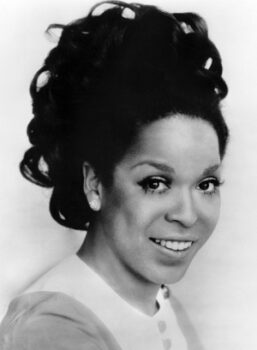 M: The following track is one that was originally recorded, well was recorded by Della Reese and I think Lou Rawls as well. It’s called Blues For The Weepers.
M: The following track is one that was originally recorded, well was recorded by Della Reese and I think Lou Rawls as well. It’s called Blues For The Weepers.
B: I heard it originally by Lou Rawls but in looking for the songs by these women, I was reintroduced to it…her version and I said well that gives me a reason to be able to use the song cause I like the song a lot.
M: How did you approach it differently than, say Della or Lou?
B: Well, to be exact, I approached it exactly like Bettye LaVette. That made it different from Della and Lou. You silly goose.
M: Now The Book Of Lies was recorded by Ruth Brown who’s one of my favourite singers back in 1958.
B: Where is Kevin when I need these names. That tune was given to me, Kevin come and help me! I was supposed to do this type of album a few years ago and…who gave me Book Of Lies?
K: Tommy LiPuma
B: Yeah, I was gonna do this kind of album with Tommy LiPuma and he gave me..
K: But not all women…..
B: Yeah, so he passed away unfortunately and I booked the tune…Kevin keeps files of any song that I like…and I so I said well, if I ever get anyone to be crazy enough to let me do this kind of album, I want to do that one too so it went in the file with …….
M: Ruth Brown was around for quite a while. I’m curious if you had any kind of interaction with her, if you guys were buddies?
B: No, this fifth career which would have allowed me to meet her because she was in that kind of rhythm and blues, bluesy resurgence that started a few years before my fifth career about 15 years ago or so and she became ill and passed away before I got a chance to meet her but she was one of the first black women that I ever saw on television and she was one of the first black women…you know I really thought that you could only be considered a good singer if you sounded a little more like Doris Day or Connie Francis or somebody and at that point in nineteen, well the first time I heard it which was before fifty-eight, I had never heard of a woman sounding like me. So I was drawn to her before I realised I sound more like Ray Charles and James Brown so I was drawn to… ‘ll do Ruth Brown tunes and Doris Day tunes the way James Brown would have done them.
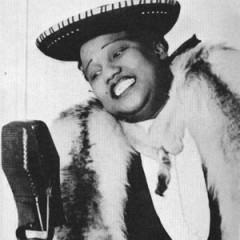 M: Romance In The Dark was originally recorded by someone named Lil Green back in the forties which I’m assuming a lot of people don’t know who she is.
M: Romance In The Dark was originally recorded by someone named Lil Green back in the forties which I’m assuming a lot of people don’t know who she is.
B: She wrote it and a lot of people have recorded it and that was the thing which was making me stay away from it, it’s just been recorded and recorded but when I heard the original version, she just sounds so little and sweet I said I want to do this, I wanna dirt and bust it up just a little. She sounded, after she did it, they made it jazzier and smoother and smoother but her sound is more juke-jointy. But her little voice was just so little and I thought it was cute so that was why I went on and decided to do that one. Then another thing that helps me with how I want to these tunes on this one as on the Bob Dylan album, Steve Jordan is I call him the tune whisperer because I come up with notions of things to do, I’ve never been inhibited by tunes, I don’t care if they’re country and western tunes or whatever, I don’t care what kind of tunes they are but if I like the melody and I like the words then more than likely I’m gonna sing it. But heretofore, I’ve not had anyone match the things that surrounded me in the song as much as Steve Jordan has and that’s probably because this is the first black producer I’ve had in a very long time.
Not hearing these songs on black radio but being in show business so young and I’ve been not fortunate enough to do a whole bunch of show business that a lot of my contemporaries have not had the chance to do such as being a Tony award winning, Broadway play and a lot of black musicians have not had the opportunity to do a tour with James Brown in James Brown’s band and The Rolling Stones band and the Saturday Night Live band. The only other one is Quincy Jones and I missed him but that was who I was looking for, what I was looking for someone who would not be intimidated by a Bob Dylan tune or a Dinah Washington tune.
M: And speaking of Dinah Washington, the next one is Drinking Again.
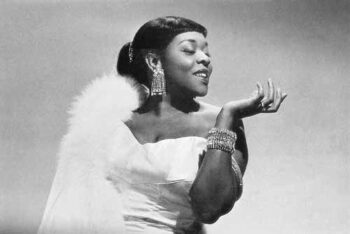 B: This is one of the tunes that my manager of many years until he died, Jim Lewis, he got me when I was about twenty and he said you sound pretty good, you got a cute booty and a little waistline but you’re gonna have to learn how to sing, you have to learn some songs and you’re gonna have to learn how to sing them. He said you might never become a star but in the case that you don’t, you can be a singer until you die as long as you know a lot of songs and know how to sing them. And he would make me learn these songs Drinking Again and a couple of the others that are on the album and I was like, ‘You just want me to be old like you, I don’t want to sing these songs’, and he would make me, I had learnt like three songs a day, two or three songs a day and I had records that they were all in national charts for some of them while we together were and he was talking to me like I didn’t know how to sing. But he made the artist that you see here before you today. He made the artist that did the British rock song album, the one that did the Bob Dylan album and the one that did this one and I certainly was not talented enough when he met me to take on all of these things.
B: This is one of the tunes that my manager of many years until he died, Jim Lewis, he got me when I was about twenty and he said you sound pretty good, you got a cute booty and a little waistline but you’re gonna have to learn how to sing, you have to learn some songs and you’re gonna have to learn how to sing them. He said you might never become a star but in the case that you don’t, you can be a singer until you die as long as you know a lot of songs and know how to sing them. And he would make me learn these songs Drinking Again and a couple of the others that are on the album and I was like, ‘You just want me to be old like you, I don’t want to sing these songs’, and he would make me, I had learnt like three songs a day, two or three songs a day and I had records that they were all in national charts for some of them while we together were and he was talking to me like I didn’t know how to sing. But he made the artist that you see here before you today. He made the artist that did the British rock song album, the one that did the Bob Dylan album and the one that did this one and I certainly was not talented enough when he met me to take on all of these things.
M: From there, Drinking Again is a fairly dark song if you really listen to it, but it doesn’t get much darker than Strange Fruit. Man, especially in this day and age singing a song like that, what did you go through to sing that song?
B: Well, I recorded it. That’s what I was saying at the top of this conversation, this may be the very first time as opposed to the artists coming up with songs that are happening with what’s going on in the world. What’s going on in the world started happening, it matched what I had already recorded. I had already done this tune. The only thing we did different was I pushed the release date up earlier for the singles they were releasing because the things that have been happening racially in this country made the song timely. I was doing it because it was a Billie Holiday tune and maybe one of her most known tunes, more closely associated with her. I just wanted to say what I had to say about it but I had no idea that the song was gonna become timely in two months.
M: It’s pretty interesting. What’s your take on what…do you think things are gonna improve after everything that’s been going on or what?
B: Oh, I think so. It feels different. I’ve seen it start up and happen before but it feels totally different. We’ve got a group of young people now that are absolutely brilliant and feel more self-entitled than certainly blacks have in the past. They feel self-entitled cause they’re here. Just cause they’re here! I’m here! And I think that is going to be the biggest change than they have while during slavery there were abolitionists, we have gosh, we have more mixed marriages now than we would ever had imagined. You know, everything feels different. This block that I live on, I’m one of maybe three blacks and everybody, when this started, put black lives matters in signs in their yard. It made me feel so good.
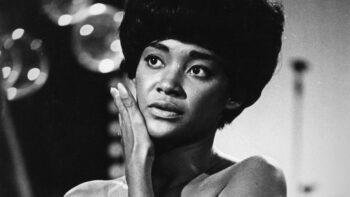 M: Excellent, that’s great. Now we have one more song that we haven’t talked about which is one that was recorded by Nancy Wilson back in 1961, Save Your Love For Me. It’s got some beautiful piano playing on it if I’m not mistaken.
M: Excellent, that’s great. Now we have one more song that we haven’t talked about which is one that was recorded by Nancy Wilson back in 1961, Save Your Love For Me. It’s got some beautiful piano playing on it if I’m not mistaken.
B: Yes, Leon Pendarvis is just brilliant and he is another one who is very like Steve Jordan because he’s had to play such a wide variety of things. He’s a music director on Saturday Night Live and has been for a long time. So he’s prepared to go anywhere I want to go. He and Steve just come here in New Jersey to my house and I sing to them what I intend to sing and they build everything else around it. It’s built specifically for me. They don’t play it and then I sing to what they play, I sing it and then they build the arrangement around me.
M: And then that brings up to Blackbird which we’ve already discussed which kind of rounds out the album.
B: But you know, I wanted to tell this. When I decided to take the song…when I said Paul was writing about me…I did a tribute at the Hollywood Bowl to The Beatles and that was how I even came into recording the song. And when I walked onto this huge stage, I live not far from there…I starved not far from there…in 1972 when I lived in Hollywood and I could walk from my apartment down there and I often did. I couldn’t afford to go in to see anything the whole two years I was out there. But I looked, standing there, I’ve never felt so tiny in my life standing on this huge stage and then this thirty two strings come in to accompany me and I really almost broke down. I did break down at rehearsa. And I told the orchestra, I said most everybody on the show were huge stars, I said everybody on this show has probably experienced this before but I haven’t because nobody knew why I was crying. And singing the song I said I’ve worked all my life, I’ve waited for this moment and that was what the song meant to me.
M: That’s fantastic. So obviously you’re kind of locked down and you can’t perform live at the moment. How does that make you feel? You’re putting a record like this out and then not being able to interact with fans and get up on stage.
B: Well my band and I put four videos together and I think the first one came out this week and that was kind of fun and different to do. My band is in Detroit and they don’t live together so everybody was…we were in five different places. But I think it came out pretty good. The Blues For The Weepers is probably streaming now or whatever they do with them. I don’t even know where you find music.
M: Probably on YouTube.
B: They came out really, really good and my husband Kevin has become the film producer. I’m very pleased with all four of the things that we did here from my house. And my husband is an antique glass dealer so there were a lot of pretty scenes to set up. And then I’m doing these interviews and that very much keeps me feeling like I’m possibly still alive.
M: I’m sure you are. I mean, you just keep on going, I think you referred to this as your fifth career or something.
B: Yes, that’s what it is. This is the first one though that seems to be kind of taking off.
M: Fantastic So have you been thinking about what you’re gonna do next?
B: I’m always thinking about what I’m gonna do next cause when I’m finished with it, I’m finished with it. Nah, I don’t think about what I’m gonna do next, I’m not feeling that but as soon as I’m finished with it and especially after it’s all out, I don’t even listen to it anymore. So I know what I want to do next but I’m not telling you.
M: Fair enough. That’s alright.
B: I haven’t seen you guys in so long.
M: Yeah I know, it was like ten years ago you were here I think.
B: There’s a breakfast there that my husband and I fell in love with. We gotta come back to get that and I don’t get up for breakfast, I don’t even eat breakfast, we got up every morning and walked to this place to get this breakfast. It was so good.
M: Fantastic. Well hopefully that will happen again sometime soon.
B: I hope so baby.
M: Get the world straightened out.
B: For sure, I hope so. I thank you so much for taking this time to talk with me about the album and helping me tell my friends in New Zealand about it.
M: My pleasure, believe me.
B: I miss you all so much, I can’t wait to see you again. Hopefully that’ll be soon.
M: Ok, have a good day, or night in your case.
B: You too baby, thank you again.
